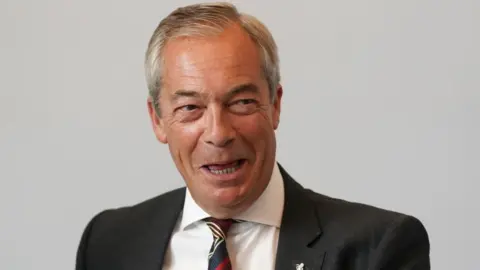In the evolving landscape of British politics, Chris Mason discusses how the momentum of Reform UK is reshaping the political weather. Recently, the party, led by notable figure Nigel Farage, has witnessed a significant influx of former Conservative Party members, indicating a shift in allegiances that could carry substantial implications for the forthcoming electoral landscape. Just within the week, the party proudly announced the defection of Sir Jake Berry, a knighted former cabinet minister, who joins a roster that includes David Jones, Anne Marie Morris, and Ross Thomson—each of whom once held esteemed positions within the Conservative Party.
The implications of this shift are profound, particularly when considering Berry’s extensive ties to high-profile Conservatives, including Boris Johnson, who served as his political patron. This marks a departure not only in party allegiance but also in ideological commitment, as Berry recently criticized the governance of both Labour and the Conservative Party starkly, suggesting that their collective leadership over the past two decades has squandered opportunities for the nation. This declaration, made by a politician who previously held the chair of the Conservative Party and served in various government departments, is indicative of the growing disenchantment within traditional Tory ranks.
Furthermore, the defection of Berry is viewed as a pivotal moment for Reform UK. Internal sources within the party expressed their satisfaction at Berry’s bold criticism of his former party, deeming it “dagger-in-the-heart” material for the Conservatives, subtly highlighting the fracture lines that may widen as more members consider a switch in allegiance. Moreover, indications from various sources suggest that this wave of departures from the Conservative Party may not be an isolated incident, with speculation about potential additional high-profile defections gaining traction.
The Conservative Party appears to be grappling with the fallout. In response, Conservative officials have attempted to downplay the significance of these defections by suggesting that while the Reform Party attracts former MPs, it is losing current representatives. However, this narrative is complicated by the suspension of James McMurdock, a sitting MP, following scrutiny over loans taken during the COVID-19 pandemic, suggesting that challenges within the party are not purely abstract.
Reform UK’s strategy is mirrored by a noteworthy pivot in Labour’s approach. Historically focused heavily on the Conservative Party, Labour is now redirecting resources and attention to monitoring and countering the influence of Reform UK. This reevaluation speaks volumes about the shifting dynamics in British politics, as a party that has historically dominated the political landscape is now compelled to give serious consideration to a relatively nascent political entity.
In recent months, Reform UK has gained traction, evidenced by their sustained performance in opinion polls, successful showings in local elections, and electoral victories, such as the recent parliamentary by-election in Runcorn and Helsby. Such accomplishments have assured the Labour Party leadership of the growing threat posed by Reform UK and have prompted changes in their strategy moving forward. Labour officials contend that the acquisition of former Conservative leaders by Reform could entrench negative economic policies that they aim to challenge.
As discussions unfold, it remains apparent that both the Conservatives and Labour must now contend with the implications of a rising, dynamic, and seemingly reinvigorated Reform UK. The political landscape as a whole may be in flux, with the once clear-cut distinctions between parliamentary party lines blurring, heralding a new era in British politics characterized by unexpected alignments and shifting loyalties. With Reform UK maintaining momentum, it is evident that they are not merely a transient phenomenon but have the potential to remain a key player in shaping the future of UK political discourse.











